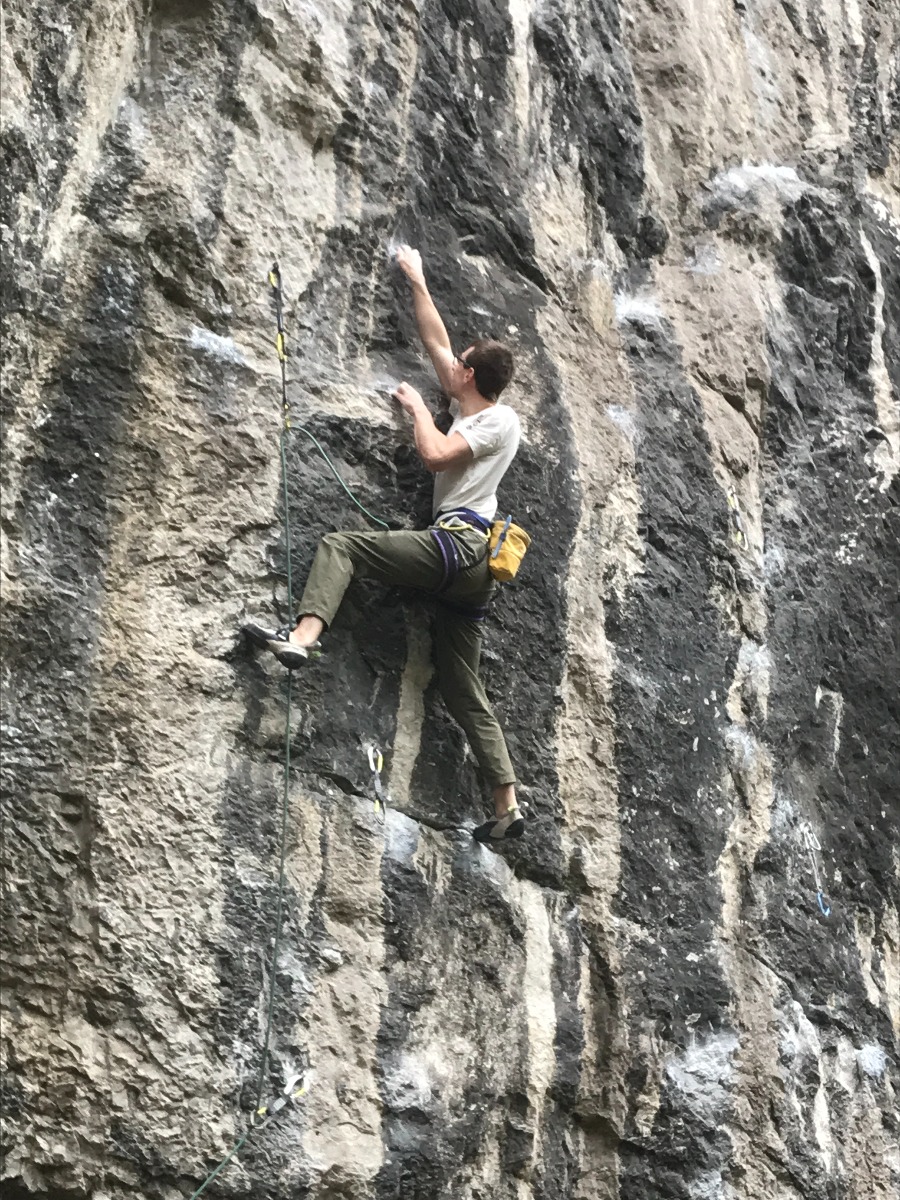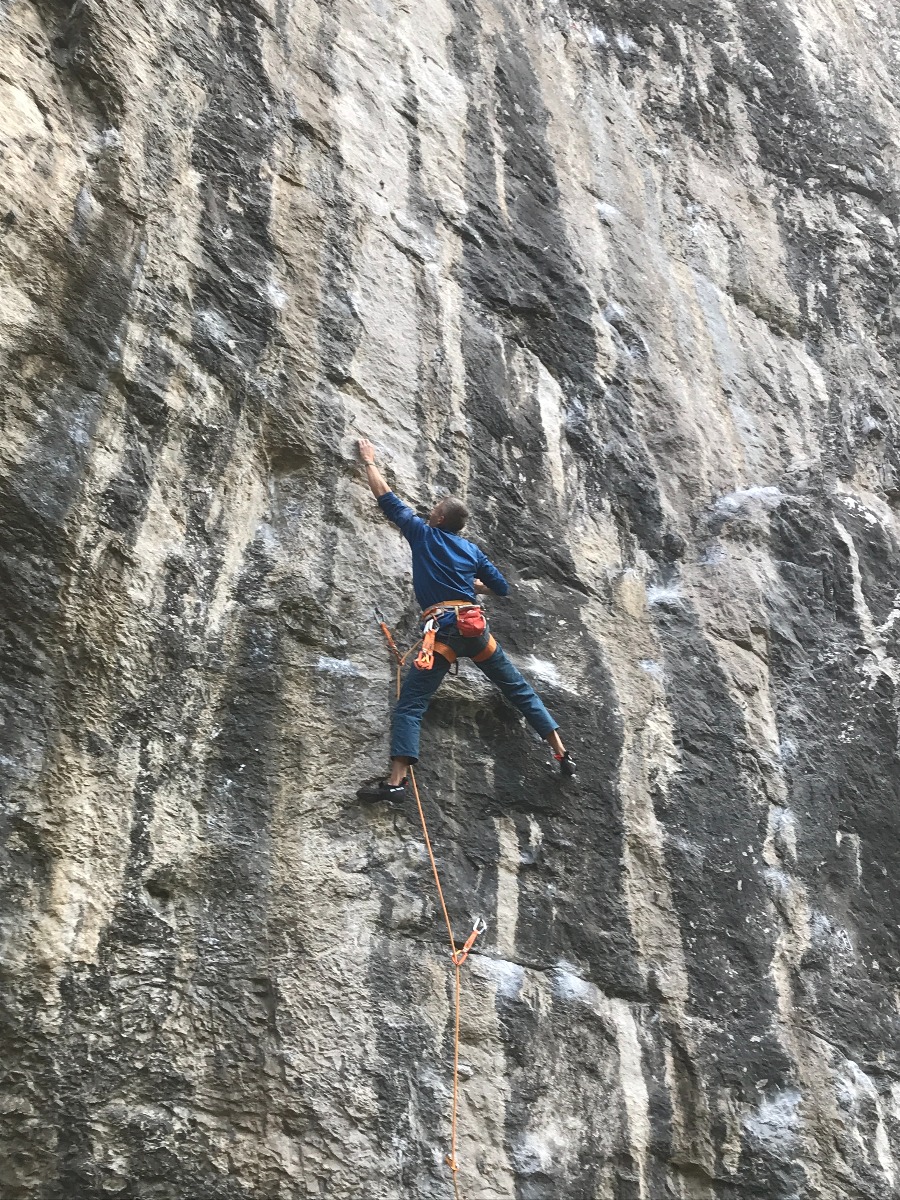It was the 14th of October 1998 when Steve McClure, a young and talented british climber, sent Mutaion, a big project that meant to him the extreme limit of his possibilities. We aren’t talking about the first 9a of climbing history, nor was he so sure to have “the right” to call it 9a. But it was the extension of an already significantly hard route (Evolution 8c+), following the most obvious line of poor footholds and tiny handholds, so that everybody seemed to agree about the grade even before he could even express an opinion.
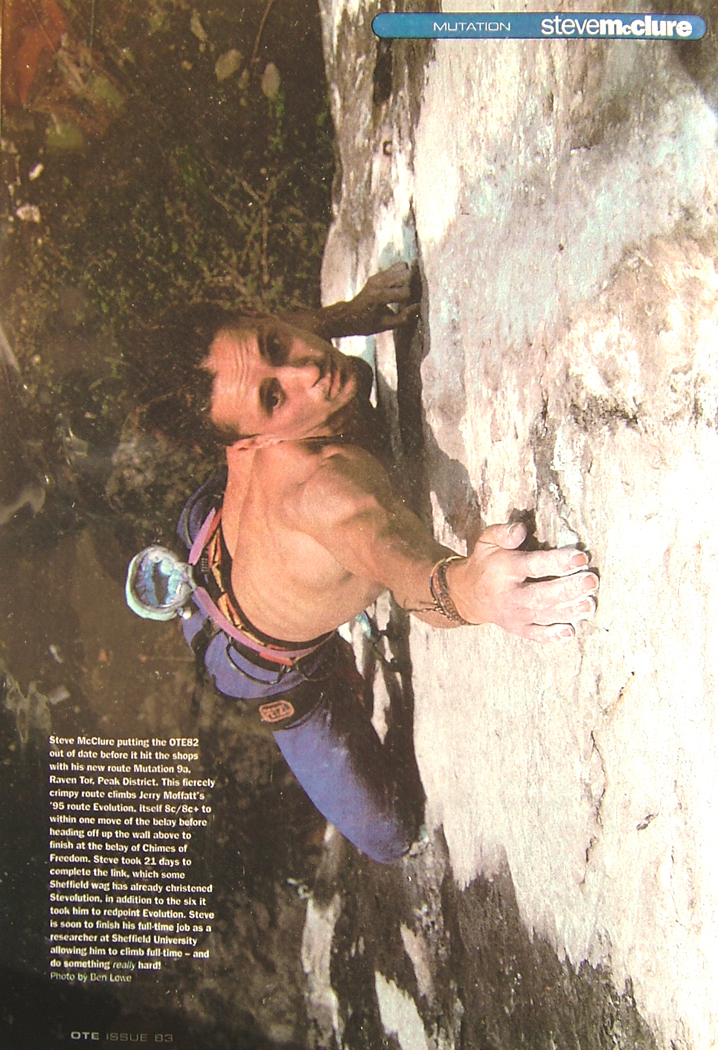
The finishing moves of Mutation. This picture was in the classic OTE magazine and blasted Steve into the public domain! (Ben Lowe).
Since 1990 the level of high-difficulty climbing has risen with Ben Moon’s masterpiece, Hubble at Raven Tor. The pictures of this short and powerful line have been on the cover of many climbing magazines, making the youngsters dream about this amazing line. But, despite Hubble predominancy in the climbing history of the 90s, Mutation still represent a fundamental page in climbing history, its complexity being confirmed by the number of repetitions: just one over these 25 years, made in 2021 by Will Bosi, that is to say 23 years after the First Ascent.
“Steve who? Steve McClure”
But who was Steve McClure back in 1998? If nowadays we know he’s a determined, solid and very skilled climber, in those years he was not yet a known climber or at least not outside the local climbers in Sheffield. He wisely chose this city as the ideal place to go forward with his studies, joining the colorful and highly motivated niche of Sheffield climbers: here he started to gain a certain reputation by modestly adding more and more difficult sport climbing routes to his personal list.
Daily life of Sheffield climbers was split into attempts to their vertical projects and parties, days at the crags and nights of pure fun: and it was right in those conversations with a high alcohol content that the amazing ascents of a young Steve McClure started to make the scene.
He was becoming part of that small elite of climbers that he considered unreachable, or better: heroes. In those years Jerry Moffat, Nic Sellars, Seb Grieve and of course Ben Moon held sway, bringing the depth of their personality and motivation to “common climbers”, and inspiring young climbers with their epic ascents. Steve was following their path not to achieve their fame and notoriety, but to learn how to push his limits a little further, strongly believing in a miracle even when it came to one chance of success in a hundred.
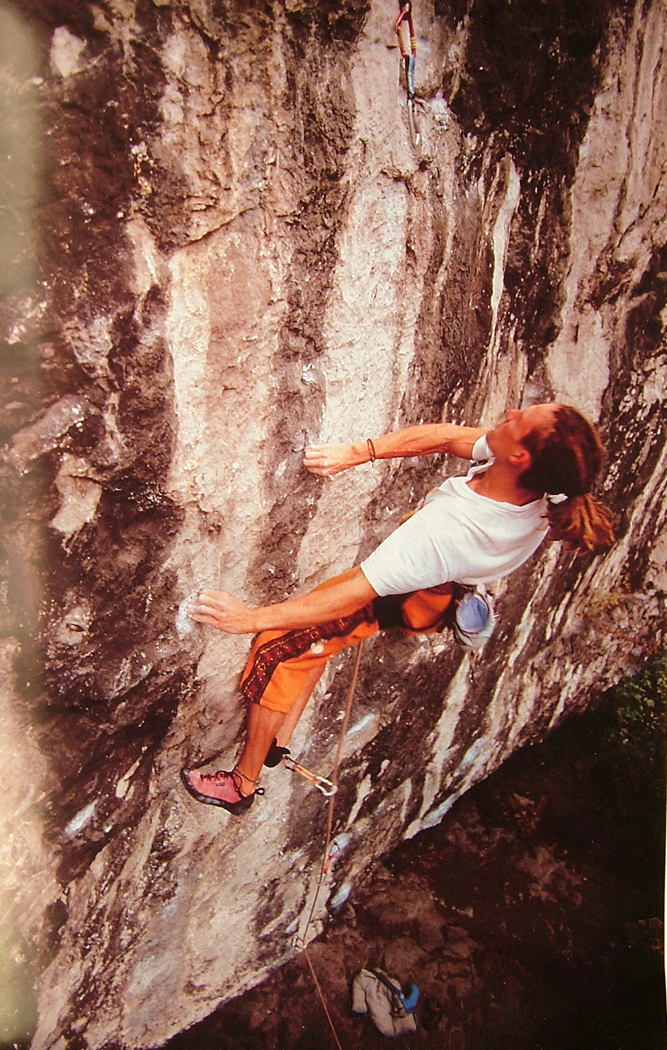
Steve setting up for the complex cross-over move where he fell many times! (Kieth Sharples)
But let’s talk about Mutation, or maybe better: the divine intervention
Do you know that feeling when you look at an extreme route, and you are aware that only a fortunate conjunction of the stars could give you that “extra flicker” to reach the anchor? That was exactly what Steve was thinking about every time he tried to “run” through the first section of the route (no less than the super hard Evolution, 8c+) with freshness and agility, thus hoping to start the second part of the route with some leeway. A desperate movement just at the very end, one of those movements that require a combination of movement and timing as well as power and strength, added some “spice” to the mental demands he needed to cope with every attempt. But on a windy day, an almost magical gust of wind gave him somehow the right boost to complete the impossible movement, marking a fundamental step in his climbing career.
For a moment he thinks about calling it “divine intervention”, then choosing a more creditable “Mutation”. This extension, bolted by Steve himself, resisted for 23 years to the attempts of all climbers trying to sign the first repetition, just as long as an “alien” of British new generations of climbers made it: we are talking about Will Bosi!
Will Bosi on an attempt on Mutation. Will, much stronger than Steve, found most of the route easier especially the cross-over, but the top wall, with the tiny edges, proved to be a tough one to crack!
Where were we in 1998?
As we said before, Steve was still thinking about the “more proper grade” when “the press” and all the climbers who have previously attempted the project, or at least Evolution, were already proposing 9a. Action Directe, our obligatory benchmark when discussing this grade, was counting just one repetition in its seven-years life (by Alexander Adler) and Om, the second 9a in the world was freed by Alex Huber in 1992, would have to wait eleven years before its first repetition by a very young Adam Ondra.
Also the others masterpieces by Alex Huber as Weisse Rose and Open Air, as well as the historical lines by Fred Rouhling, all freed before Mutation, were leading the path to high difficulty in climbing, even though taking charge of all the uncertainties tied to this still new grade. Every route was the result of the path of those who had first seen it, then bolted it, then believed it could be feasible. Measuring their own abilities, skills and mental strength.
The 9a, universally assigned by all the climbers of those years has never been changed: instead, Will Bosi, after his first repetition in 2021 and strong of its experience on hard routes, proposed a solid 9a+. A grade that could change the history of climbing, maybe of the first ever 9a+in climbing, but that will never change what it meant to Steve and what still represents to all of us.
Steve on Evolution in 2001, just to see how the route felt after so many years! Still hard, of course!
Steve McClure talks about Mutation – 25 years later
25 years later Steve McClure’s First Ascent we wanted to have a talk with him and to ask him about this magic line and his life.
25 years have passed and just one repetition: have you ever imagined that Mutation would have become such a challenging route, despite the natural evolution of this sport?
Yes 25 years! Wow, that’s a long time! No so much for a second ascent to have occurred, but it just makes me think I’ve been climbing in this style for ages now! Half of my life. I never considered Mutation would be challenging for others, it was purely my challenge back then. It is lovely to have a new route for others to try too, but I didn’t really think about the way it would challenge them. To be honest, I guess I assumed others would climb it fairly quickly, as they were stronger.
Why is Mutation so hard also for the new generations?
Mutation is a real ‘rock climb’. It has complex moves with bad footholds and bad handholds. It requires a depth of rock climbing skills, and not so much of the indoor skills. Hence, as the new generation mix up their outdoor climbing with indoor training, the indoor training perhaps does not add that much to the chance of success. They may be much ‘stronger’ but outdoor skills and strengths really count. When I climbed Mutation I was rarely climbing indoors at all, only outdoors, and crucially, at Raven Tor a LOT. The route also suits my style exactly, being on small holds with real body tension and high steps. I got super lucky with this one!
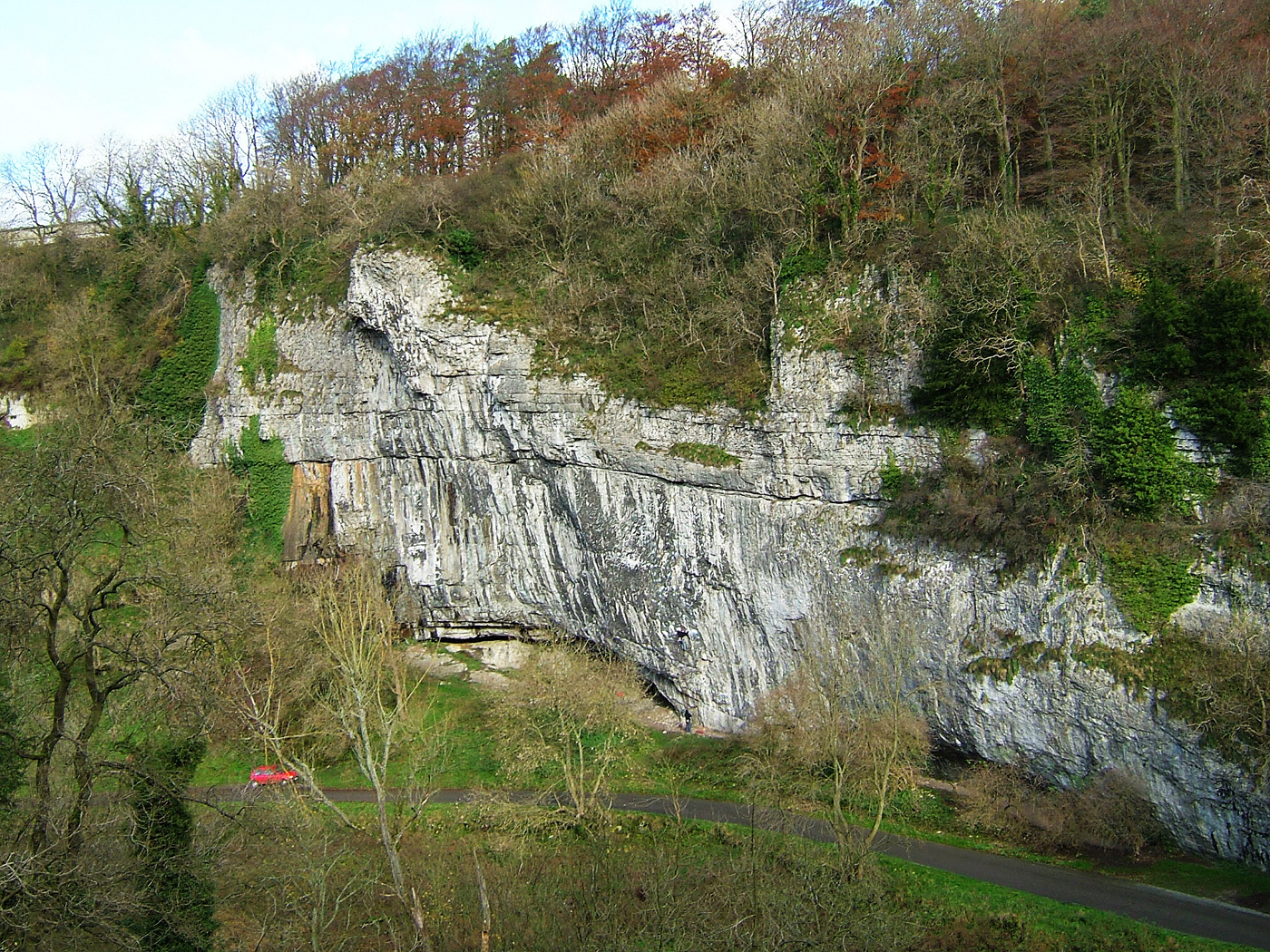
What have you learnt about yourself now that you are aware that you have written a page (or more) of climbing history?
I am aware that I have written ‘some pages’ that may be part of climbing history… but basically I have learnt that I am the same climber that I have always been! I’m not in it to be famous, to write history or to be the best. I’m just a climber who likes to go climbing, likes to be in the outdoors. I like to try hard and challenge myself. I think this will always be the case.
Among all the things that have happened after the send of Mutation (as, for example, the gaining of a solid self-confidence in your skills), which is the one you feel most grateful for?
I’m most grateful for the way in which my life turned out. Mutation, and routes that followed, allowed me, with some luck, to enter into the ‘climbing industry’ and now I can make a living out of the sport with route setting, coaching, talks, writing, team management, product testing etc etc. This has been amazing! I love my work, it does not feel like work most of the time even though there are long and hard days. But I have so much flexibility, I have visited some great places, met amazing people, and had many awesome holidays with my family. I used to be an engineer, working 8-6 five days a week… I liked it, it seemed a lifelong job…. But my working life is way better now! I’ll never be a rich man when it comes to money, but I’m already rich when it comes to fun!

